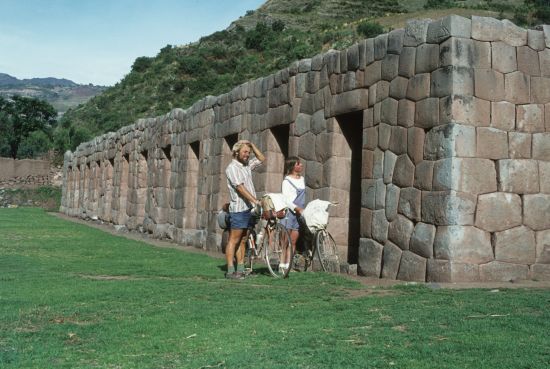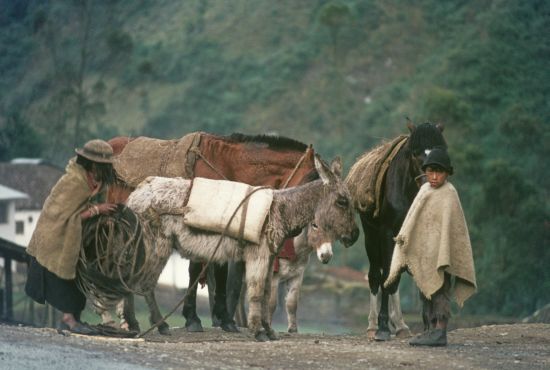| Barelds - Cycling around the world - Cycle stories - Asia, Africa, Europe, America | ||||||||||||||||||||
| home | site map | world | children | recent | cooking | dutch | german | react | ||||||||||||
South-America (5).

Peru: Enormous stones of the Inca buildings, fitted so precisely that they had withstood all the earthquakes well.
Y
ou cannot very often go shopping of course at a height of 4000 meters. Very soon we were eating our corn porridge again. "It won't get done," I remarked surprised, after it had simmered quite a long time. Also did we no longer burn our tongue on the boiling tea this also had become a watery brew, at a temperature of 80°C (176°F), the tea does not brew anymore."If I only had a pressure cooker" I sighed, while tasting the rice once again, "it is still not done." The Multi fuel Stove was flashing in the tent, it clearly also had shortage of oxygen. We never cooked inside the closed tent but, outside a fierce sand storm was raging. That, we had noticed, happened all the time, in the afternoon on the Altiplano, as the highplateau is called here.
The day before, in an idyllic river valley, the storm rose as by magic, we had to turn the tent, with the luggage, and all in it, very quickly. Here we had, very wisely, put up the tent in the middle of the village square, sheltered by the church and the houses and even behind a wall. But just as well, outside cooking was impossible.
Puro plano" (completely flat) the people said about the road which lay ahead of us. And indeed we did not thunder down 2000 meters as we did 2 days ago, to climb up the next day 4000 meters, but this meaning of "flat", was different from what we had imagined. Moreover, we had eaten "little breakfast", neither had we extra food in the bag, thinking that we would arrive in the town of Potosí before coffee time.
Potosí, a miners town, manifested itself long before, everywhere holes were dug out in the mountains in front of them, heaps of rubbish and people, searching for ores like moles. The river we cycled along, was still frozen hard.
On the other side were two men, miners in patched-up, grey ponchos, the inseparable tsjullo on their heads and they beckoned us. We walked on the ice. Smiling they greeted us and took an aluminum mug from underneath the poncho.

Ecuador: Almost all indians looked very poor, neglected and dirty here, a difference with the previous countries."
A smaller mug and a smaller bottle which contains a clear brew, should now be tried. Quite some higher percentages, we already knew the home brewed stuff. I drank as little as politeness allowed me and we left the men after this appropriate honour to their dead.
But oh dear, this was a blow on my empty stomach and the lead sank in my legs. With every bend we hope to be at the top, but new climbs lay ahead of us. The last few hundred meters I was completely exhausted, and Henny pushed my bike up the hill. Exhausted we lay on the ground for a while to recover.
At the top was a police station: on it was written 4.500 meters, no wonder. A policeman sat in front of it and played his guitar, he had not any intention to check our passports laboriously as his colleagues did in the previous South American countries. "I will get you refresco", he said and he brought us a glass with orange juice. Thirsty as I was, I was going to pour it into my mouth, but it burned in my stomach. What a fortune that we only had to go down. Just got into a hotel and we flew into the bed.
T
he border between Bolivia and Peru - near Lake Titicaca - consisted of no fewer than 12 check points, police, customs, army and I don't know what kind of other officials. And they all wanted to see the papers for our bicycles. And we had to explain, to all of them, that we in Holland don't have papers for bicycles. Some cycling Bolivians, who at every checkpoint borrowed our pump, because one of them had a punctured tyre, said, that they did have papers, whereupon we went to the Dutch Embassy in the next capital and asked them to draft a nice letter with a lot of stamps stating that in Holland for cyclists papers are not required. This helped.
| Start World around | South-America | << Previous | Next page >> | |||
| Barelds on bicycle through the world - Cycling in Asia, Europe, Africa, America | ||||||